- Home
- P. T. Deutermann
The Last Man Page 20
The Last Man Read online
Page 20
“I trusted you,” she began, visibly controlling her temper.
“Now wait a minute,” he interrupted. “I haven’t done anything wrong. Stupid, maybe, but it’s not like I was up there digging for buried treasure or something. I just needed to go up there, at night, without the tourists. To imagine what it was like. To imagine the fire lights of the Roman camps all around the mountain. To wander among the ruins, seeing them as the palaces they once were. It’s beautiful. Sad but beautiful.”
“It is not allowed,” she replied. “It is not safe. Don’t you understand? If something had happened to you they would have come after me. I will have to report this, you know. To the institute. I could lose my job. I don’t suppose that crossed your mind at all?”
“I am sorry. I think they will blame me for taking off in the night, though, not you. You can’t be everywhere, twenty-four seven. I didn’t go down anywhere dangerous, like the northern terraces. Just on the top. Remember, it’s what I came here to do.”
She rolled her eyes. “So this is what you mean by, what was your phrase, ‘going for it’? Regardless of any consequences?”
He had felt a flush of embarrassment cross his face. His fine words on the beach sounded hollow, coming back like this.
“Tell me something,” he said, scrambling for cover. “Did you never do that, when you were down here on one of the digs?”
She had tossed her head and groaned in exasperation, but then she had turned her face away, as if he’d uncovered a painful memory. “Yes,” she sighed impatiently, “but not by myself, and not without someone knowing I was up there. What you did was foolish and an affront to our hospitality.”
He had stared down at his feet. “Well, again I apologize. It’s just that there was no way I could capture the spirit of that place during the day, not with all those half-dressed girls cavorting all over the place. Kids on a lark where nearly a thousand people committed suicide. It’s what I really came here for, Judith. I’m done now. We can leave in the morning. I guess I mean today.”
She had fixed him with a steady stare. He couldn’t tell if she believed him or was still trying to pick a hole in what he was saying.
“Yes,” she said at last. “You are done here. We will leave at nine this morning, after I have had a little talk with the center manager—and, of course, after I make some phone calls to the authorities in Jerusalem.”
“I understand. I didn’t take anything, though. No souvenirs, no bits of rock, nothing. I just looked. Do you want to search my pack? My room?” She was obviously taking this personally, and he was feeling rotten about that. The look she was giving him confirmed it. She was really angry with him: She had trusted him, opened up to him, and he had gone sneaking around behind her back at night. Finally she turned away.
“Nine o’clock, Mr. Hall,” she said over her shoulder. “Be prompt, please.” Then she had stomped away, back into the tourist center, leaving him standing in the parking lot. As he watched her go, he felt the first inklings of real regret. It was more than the fact that she had trusted him. She had made the first tentative moves back toward life, something she probably needed very much to do. He might have inadvertently sabotaged that.
Now, waiting in the cafeteria, he stared up at the mountain basking indifferently in the early morning sunlight and thought about that giant cistern. Full of water! He had just assumed it would be bone dry, like the rest of them, but this one did not depend on the wadis or man-made dams. This one depended only on rain, twenty centuries of rain. He wondered again how old that water was. Once the cistern had filled, everything else would have sluiced off through the bat cave and down the hillside.
Thank God I brought the diving gear. What had been part of his cover story was now going to be the main event. If they don’t throw your ass out of the country first, he reminded himself. He kind of doubted that they would, not for just walking around. If they had caught him up there in the cistern, he might be headed for an Israeli courtroom, but sneaking out of the hostel, walking around the wilderness at night, was, as the sergeant had pointed out, more an issue of stupidity than criminal trespass.
Fortunately, he had his dive expedition reservations all set up. What he had to do now was some detailed planning and forget about the lovely Ressner. That should be easy enough, he thought, remembering her final acid look in the parking lot.
* * *
Judith called in to the institute at eight thirty, this time from inside the manager’s office, courtesy of one of the cafeteria workers. The manager did not normally come down from Jerusalem until nine. She had explained the problem to the chairman’s assistant, who promised to relay the story to Himself, as the chairman was known to his staff. Judith had the impression that the assistant was not as upset about the American’s nocturnal walkabout as she was. She hung up, thought about calling Ellerstein, but then realized he would hear about it from the chairman’s office soon enough. She went upstairs to throw her things together.
While she was packing, she remembered Colonel Skuratov. Her heart sank. The chairman and the rest of the academics might frown on what the American had done, but the security officer would be another problem. She could just see the fanatical gleam in that scary old Russian’s eye. In a way, though, his instincts had been correct: The American obviously had planned to go out at night right from the start, as the pieces of paper in the fire door lock proved. The late afternoon meal and then a “nap.” She had made a big deal out there in the parking lot about one night up on the mountain, but now she realized that he had probably been up there twice. Damn the man. Damn all Americans!
She fished around in her briefcase and found the card. International Planning Division, Ministry of the Interior. M. L. Skuratov. No Colonel. No hint of the security world. Planning indeed. Just another government phone number. She went back down to the office. She still had about ten minutes before the manager showed up.
“International Planning,” a man’s voice answered in Hebrew.
“I need to speak to Colonel Skuratov.”
“He is not available. Your name and message, please?”
She hesitated. “This is Dr. Yehudit Ressner. He will know the name.”
“Yes, Doctor? The message, please?”
“Tell him the American went out at night on his own. To the site. Probably twice. An army patrol found him this morning coming back along the Wadi Metsadá. We are leaving the site for Tel Aviv this morning.”
There was a minute of silence.
“I have it. Where can he reach you tomorrow night?”
“Tomorrow night?”
“Yes. He will be unavailable until then.”
“At home.” She gave him the number, dreading the fact that she wasn’t finished with the colonel. Wonderful. Damned American.
“Thank you, Doctor.” The connection was broken. She was left standing there, the phone in her hand, when the fat manager came bustling through the door and started to upbraid her about being in the office.
“Oh, sod off,” she hissed at him in Hebrew and stamped out of the office, leaving him speechless.
15
On Saturday morning David awoke back in his hotel room to the sounds of maid service carts rattling down the hallway. He opened one eye and looked at his watch. Well, maybe no longer morning. It was just noon. He got up and went over to the windows and pulled back the night curtain, revealing a bright, sunny day.
He frowned as he recalled the Friday morning ride back from Masada. Judith had treated him to a frosty silence for the entire trip, meeting his two weak attempts at conversation with curt, monosyllabic replies. When they arrived at the hotel she had turned in her seat. “I have called Professor Strauss with respect to your nocturnal excursions at Metsadá. Both of them, yes? The committee will meet on Sunday to discuss what actions they might take. They will also inform the Israel Antiquities Authority.”
“Beyond unauthorized walking about the site at night, what’s the charge, Officer?” he had asked, trying to keep it
light.
“Charge? You misrepresented yourself and the true nature of your so-called project. The government made special accommodation for you, and you took advantage of them. Us. The IAA may not take that as lightly as you do, Mr. Hall.”
Her expression and tone of voice revealed that the “us” was just as angry with him as the government might be. Misrepresented myself, he had thought. Jesus. If they only knew.
“Well, again I apologize,” he said, “but I did no real harm up there. Hell, you let me wander around up there unattended all day on Thursday.”
“That was different. The security staff was in place. There were people about. If something had happened to you, there would have been help available. But to be wandering around out in the wadis at night, climbing that ramp, even walking the casemate walls in the dark—there are no railings, remember? Four hundred meters straight down? And that patrol: You were very, very lucky there.”
“So what’s next?” he replied, tiring of the harangue, trying hard to ignore the ass-kicking his conscience was all too ready to hand him.
“That will be up to the committee and the IAA. I suspect that if you want to play tourist next week, they will not object, as long as you are supervised by an approved tour operator. However, you are no longer welcome in official Israel, Mr. Hall.”
He had tried to think of some smart reply, couldn’t, and just nodded instead. He got out of the car and grabbed his gear from the backseat and put it down on the sidewalk. He stuck his head back into the car window.
“Well, so long, Mrs. Ressner. Despite the way it ended, it was still a pleasure to know you. Good luck with the rest of your life.”
He frowned now as he remembered the vexed expression that crossed her face when he made that last comment. Shit. Well, remember what you’re here for, he reminded himself, for the umpteenth time. Focus. Think about this: If they were pissed at your taking a walk at night, they’ll go positively ape-shit when they find out what you’re planning next. They damn well better not find out about that.
That thought led to the consideration of next moves: If he was lucky, they would not throw him out of the country. They would check the site to be sure there were no signs of digging or missing artifacts. They might detect the missing building stones, but he doubted it. He also doubted they would go down into the rim cisterns: Nobody had been in there but the bats for a long time. Besides, as far as the archaeologists were concerned, the cisterns were all just dry holes. Hell, that reeking pile of bat guano he had put by the cave entrance ought to do the trick if nothing else.
On the other hand, after this “incident,” whoever had sent the watcher at the airport might just keep him under surveillance here in Tel Aviv for a couple of days. Just to make sure. The Ministry of the Interior owned the archaeological sites, through the Israel Antiquities Authority. The ministry probably had ties to state security organizations. He thought about the guy in the airport. Maybe he was overdoing this—it was more likely that the guy in the airport was just another layer of airport security.
So: Today he would hole up, recovering his energy after the busy nights down on the mountain. Saturday meant Shabbat until sunset, so the country was essentially shut down anyway. Sunday things would be open again. He had his hired car and Ari turned back on, starting tomorrow. He would go over to Yafo Sunday morning to the dive shop and get set up for the expedition to Caesarea Maritima. Monday he would go make the first tour dive. Monday afternoon, he would drive around, see some other sites, and watch his back. He needed to convince any watchers that he had reverted to being boy tourist, going diving up on the coast in the mornings and touring the historical sites in the afternoons. No longer interested in things archaeological, and certainly not in Masada.
He would also spend some time here at the hotel, ostensibly transcribing notes from his trip down to the fortress. If they were really mad at him and got, say Shabak into it, they might even search his room. He should probably provide opportunities for anyone who might be interested to take a look into his computer. After recording the dimensions of the hidden cave in an otherwise innocuous file, he had erased all the seismic data files and even the program that computed the display. He would make a bunch of notes in a clearly labeled directory and then leave the computer unattended in the room. Just for the hell of it, he decided to activate a counter routine in the boot files that would tell him if the machine had been turned on in his absence. He would trash the four geophones, the data concentrator, and the wire today, which would eliminate all physical traces of the seismic survey. The devices were excess baggage now that he had confirmed there was another cistern and had found the way into it.
His diving gear, which now he needed in earnest, would also be on prominent display. Well, he was going to do some diving, right? Assuming he was going to be watched, the trick was to live the cover story, building up a pile of evidence to support it. From years of reading cloak-and-dagger books, he knew that if one wanted to get out from under a surveillance operation, the best way was to ensure that the watchers’ logbooks became filled with perfectly ordinary entries. The objective was to shape the outcome of the meeting at which the watchers decide whether or not to continue the surveillance: the cost of overtime personnel versus what the surveillance reports were indicating. Give them nothing out of character to hang their hats on. Theories were theories; budgets were real. Get them to say the hell with it and go on to something else.
Then, of course, the hard part: deciding when the surveillance had been called off, so he could make his move. Two days? Three days? Assuming someone even gave a damn about David Hall, scuba tourist. He might be wrong about this, but better safe than sorry, considering the magnitude of what he was planning next.
He went back in to shower, shave, and mentally massage his new plan. He would arrange three days of dives, starting Monday. While playing tourist, he would surreptitiously arrange to rent a four-wheel-drive vehicle and some basic camping gear. Tuesday, same routine: morning dive, tourist ops in the afternoon. On Wednesday he would call into the dive shop, tell them he wasn’t feeling well. Cancel Wednesday’s dive. He would collect the rental car and his gear at midday and then make a late afternoon trip back down the Dead Sea road to the vicinity of the mountain. His objective would be to avoid detection long enough to get himself in position to make one more night expedition to the fortress. He would need to set up a base of operations. Maybe use the rim cistern itself?
The logistics would be daunting. He needed to think about that aspect some more. Humping all that heavy diving gear up the mountain would be really hard, not to mention evading the damn patrols. That sergeant had probably had his ass chewed for not catching him the first time, although thankfully no one had asked him if there had been a first time. Judith had figured it out, though, hadn’t she?
Then there would be the matter of actually making the dive. The thought of that one curled his hair a little bit. He would be breaking every fundamental rule of diving: You never go down at night; you never go down alone or at least without surface backup; you never go into something without having the first damned idea of what’s down there—how big it really is, how deep, what the water temperature is … all fundamental stuff. It would also be cave diving, the most dangerous kind of diving. He’d read books about it, and at the end of each one he’d sworn he’d never even try that.
As he stood in the shower, his better sense was fairly shouting at him not to go through with this harebrained plan. He should call Judith, tell her what he’d really been doing and what he’d discovered. She might not believe it, but once she told the archaeology world what he’d found, especially the slab, someone would mount a proper expedition.
He took a deep breath and then put off making his decision. Right now, it was time to get into character as an innocent tourist. He wondered what Adrian would have thought of all this. He could almost hear her: Go for it!
* * *
Judith was attending to her laundry when Prof
essor Ellerstein called Saturday evening. Half expecting Skuratov, she had almost not picked up the phone. Hearing Ellerstein’s avuncular voice was a relief.
“Yehudit, how are you?” Ellerstein began, his voice solicitous. No hint of condemnation.
“I’m back, Yossi. I suppose you’ve heard what happened down there?”
“I have indeed. Armin Strauss called me. It seems we now have to have a meeting tomorrow. As much as I love meetings, I can hardly wait.”
“What are they saying?”
“They? Himself wrings his hands, as is his custom. The IAA is waiting for the security people at Metsadá to verify that no harm was done.”
“I think that will come out all right,” she said, trying to keep a hopeful tone out of her voice. The American better not have been digging. “They took a quick look around for me Friday morning. Nothing seems to have been disturbed.”
“Yes, that is what Strauss reported. That you felt the man really was just wandering around up there, communing with the spirits, exactly as he said he wanted to do. I think this is not all that serious. The man probably simply succumbed to the mystery of the place.”
She hesitated for a moment. “I’m not sure Colonel Skuratov will see it that way.”
This time it was Ellerstein who hesitated. “Colonel Skuratov? Who is this Colonel Skuratov? How is he involved with this matter?”
“He is someone important in the military security services at Dimona. He came to see me the night before we left for Metsadá. He told me that the IDF was concerned about what this American was doing, going down there.”
Ellerstein cleared his throat. “Oh, yes. I think I remember him. Odd-looking Russian. Some extreme history there. But Dimona? What on earth—”
“Yes, I had the same question. All he said was that they wanted me to watch this American for them.”
“Them? What them? You mean Shin Bet? Why would they care?”
“I have no idea, Yossi,” she said. “I—I had met this Skuratov before. He was one of the people from Dimona who came along the night they told me Dov had been killed. He is … memorable.”

 The Nugget
The Nugget The Hooligans
The Hooligans SPIDER MOUNTAIN
SPIDER MOUNTAIN![Cold Frame [retail] Read online](http://i1.bookreadfree.com/i/03/19/cold_frame_retail_preview.jpg) Cold Frame [retail]
Cold Frame [retail] Sweepers
Sweepers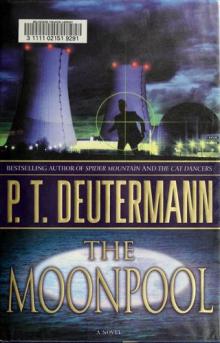 Cam - 03 - The Moonpool
Cam - 03 - The Moonpool Trial by Fire
Trial by Fire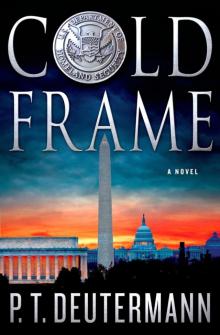 Cold Frame
Cold Frame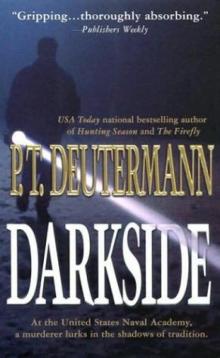 Darkside
Darkside Cam - 04 - Nightwalkers
Cam - 04 - Nightwalkers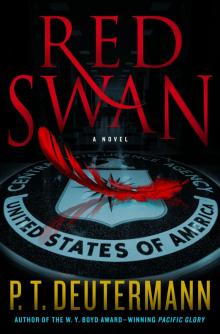 Red Swan
Red Swan The Commodore
The Commodore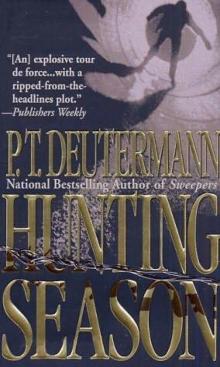 Hunting Season
Hunting Season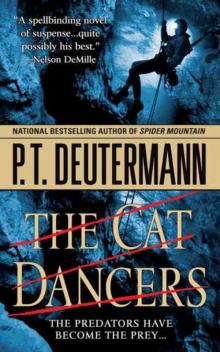 The Cat Dancers
The Cat Dancers Scorpion in the Sea
Scorpion in the Sea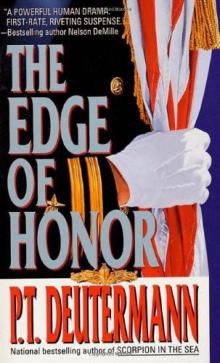 The Edge of Honor
The Edge of Honor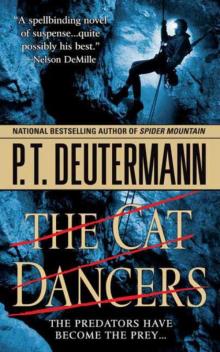 The Cat Dancers cr-1
The Cat Dancers cr-1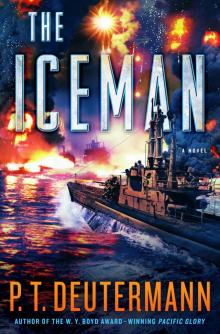 The Iceman
The Iceman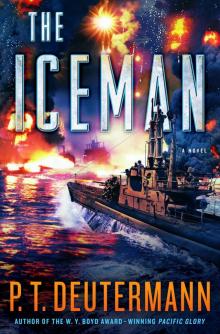 The Iceman_A Novel
The Iceman_A Novel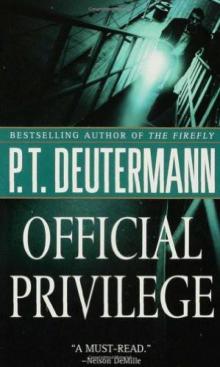 Official Privilege
Official Privilege Sentinels of Fire
Sentinels of Fire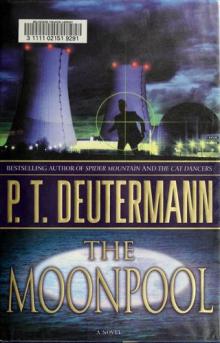 The Moonpool cr-3
The Moonpool cr-3 Nightwalkers cr-4
Nightwalkers cr-4 The Firefly
The Firefly Spider mountain cr-2
Spider mountain cr-2 Pacific Glory
Pacific Glory The Last Man
The Last Man